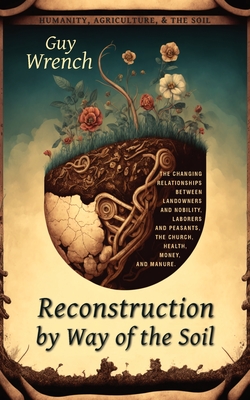Reconstruction by Way of the Soil

Reconstruction by Way of the Soil
"Our agriculture is wrongly based. It is a system largely directed at curing evils which it itself is responsible for. It is the wisdom of the country and the traditional farmers we need now; the wisdom of those who have built up long-lasting agriculture and whose wisdom lies in tradition. They have fashioned it through physical work and close and immediate observation; through the personal intimacy with nature which we have come to associate with the poet.
In fact, peasant life is poetic, and it is so precisely because of this intimacy. The music, dance and art of peasants are the creative expression of their lives, and as such are characteristic of their environments and the land on which they live.
Nothing collective or traditional, as peasant life is, originates from people separated from the soil, as are townfolk.
The poems and essays that played a notable part in the country life of the Chinese, the Tibetan art which finds its way into every home, the sylvan setting of Japanese villages, of the Balinese and Burmese, the vocal harmony of Swiss peasants returning from their fields, the reproduction of floral beauty and colour in festive dress of so many countries; these are the product of the poet that lies in every peasant's heart.
It is this intimacy that inspires creativity in the poet, as the Greeks recognized in their choice of word for poet, namely, a 'maker' or creator, and which Dante voiced in the Divine Comedy, when he wrote that the poet was not the disciple of the imagination, but rather one who knows the secrets of nature."
- Guy Wrench
CONTENTS
- Introduction
- Rome
- The Roman Foods
- The Roman Family
- Soil Erosion in ancient Rome
- Farmers and Nomads
- Contrasting Pictures
- Banks for the Soil
- The Economics of the Soil
- The English Peasant
- Primitive Farmers
- Nyasa
- Tanganyika
- Humanity and the Earth
- Sind and Egypt
- Fragmentation
- The East and West Indies
- The German Colonies: The Mandates
- Russia, South Africa, Australia
- The United States of America
- A Kingdom of Agricultural Art in Europe
- An Historical Reconstruction
- Summary
- A Plan for Action
Descrierea produsului
"Our agriculture is wrongly based. It is a system largely directed at curing evils which it itself is responsible for. It is the wisdom of the country and the traditional farmers we need now; the wisdom of those who have built up long-lasting agriculture and whose wisdom lies in tradition. They have fashioned it through physical work and close and immediate observation; through the personal intimacy with nature which we have come to associate with the poet.
In fact, peasant life is poetic, and it is so precisely because of this intimacy. The music, dance and art of peasants are the creative expression of their lives, and as such are characteristic of their environments and the land on which they live.
Nothing collective or traditional, as peasant life is, originates from people separated from the soil, as are townfolk.
The poems and essays that played a notable part in the country life of the Chinese, the Tibetan art which finds its way into every home, the sylvan setting of Japanese villages, of the Balinese and Burmese, the vocal harmony of Swiss peasants returning from their fields, the reproduction of floral beauty and colour in festive dress of so many countries; these are the product of the poet that lies in every peasant's heart.
It is this intimacy that inspires creativity in the poet, as the Greeks recognized in their choice of word for poet, namely, a 'maker' or creator, and which Dante voiced in the Divine Comedy, when he wrote that the poet was not the disciple of the imagination, but rather one who knows the secrets of nature."
- Guy Wrench
CONTENTS
- Introduction
- Rome
- The Roman Foods
- The Roman Family
- Soil Erosion in ancient Rome
- Farmers and Nomads
- Contrasting Pictures
- Banks for the Soil
- The Economics of the Soil
- The English Peasant
- Primitive Farmers
- Nyasa
- Tanganyika
- Humanity and the Earth
- Sind and Egypt
- Fragmentation
- The East and West Indies
- The German Colonies: The Mandates
- Russia, South Africa, Australia
- The United States of America
- A Kingdom of Agricultural Art in Europe
- An Historical Reconstruction
- Summary
- A Plan for Action
Detaliile produsului












